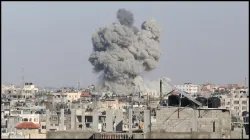Israel orders new evacuations in Gaza's Rafah city as it prepares to expand operations
Israel plans to step up operations in Rafah, believing it to be Hamas' last stronghold, despite mounting international concerns over a surge of civilian deaths. About 110,000 people have fled Rafah as all crossings have been closed, causing food and fuel supplies to reach a critical low.

Gaza: Despite increasing international pressure, a defiant Israel has ordered residents from more areas of Rafah in the Gaza Strip to evacuate and head to the "expanded humanitarian area" in Al-Mawasi, according to the military's Arabic spokesperson. The evacuations were ordered as Israel prepares to expand its operations in Rafah, saying it was also moving into an area in northern Gaza where Hamas has regrouped.
The Israeli army spokesman, Avichay Adraee, told Palestinians in Jabaliya and Beit Lahiya cities and the surrounding areas to leave their homes and head to shelters in the west of Gaza City, warning that people were in “a dangerous combat zone” and that Israel was going to strike with “great force”. This came as Hamas appeared to have regrouped in an area where Israel has already launched devastating airstrikes.
Fighting is escalating across the besieged Palestinian enclave as heavy clashes have been reported between Israeli troops and Palestinian militants on the outskirts of Rafah, leaving the crucial nearby aid crossings inaccessible and forcing more than 110,000 people to flee north. Israel's move into Rafah has so far been short of the full-scale invasion that it has planned.
Fighting escalates and casualties mount
At least 19 people, including eight women and eight children, were killed overnight in Central Gaza in three different strikes that hit the towns of Zawaida, Maghazi and Deir al Balah, according to Al Aqsa Martyrs Hospital in Deir al Balah and an Associated Press journalist who counted the bodies., as fighting erupted this week in the Zeitoun area on the outskirts of Gaza City.
More than 1.4 million Palestinians — half of Gaza's population — have been sheltering in Rafah, most after fleeing Israel's offensives elsewhere. The United Nations and other agencies have warned for weeks that an Israeli assault on Rafah, which borders Egypt near the main aid entry points, would cripple humanitarian operations and cause a disastrous surge in civilian casualties. Israel's closest ally - the United States- also opposes the invasion on humanitarian grounds.
Israel seized the Gaza side of the Rafah crossing with Egypt on Tuesday, and it's unclear when it will reopen. Israel reopened its side of the nearby Kerem Shalom crossing — Gaza's main cargo terminal — after a rocket attack over the weekend, but the UN's main provider of humanitarian assistance said aid cannot be brought in on the Palestinian side because of the security situation.
Pressure on Israel as US threatens to withhold arms
Israel's military conduct has come under increasing scrutiny with the soaring death toll and the level of devastation in the Gaza Strip. The US has already paused a shipment of 1,800 2,000-pound (900 kg) bombs and 1,700 500-pound (225 kg) bombs, over concerns that it was approaching a decision on launching a full-scale assault on Rafah against the wishes of the US.
Later, US President Joe Biden explicitly warned that he would stop supplying weapons if Israeli forces launched a major invasion in the southern Gaza city of Rafah. In a defiant response, Israeli Prime Minister Benjamin Netanyahu declared that Israel would "stand alone" if necessary and would "fight with our fingernails".
Israel believes that a significant number of Hamas fighters, along with potentially dozens of hostages, are in Rafah and has said that victory requires taking the key city. The US, Israel's closest ally, said it must not invade Rafah without a full plan in place to protect civilians there, which has yet to be presented.
(with inputs from agencies)
ALSO READ | US says Israel's use of weapons in Gaza may have violated international law, evidence incomplete
